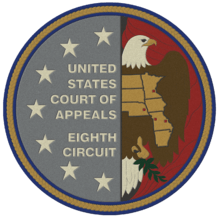Planned Parenthood v. Rounds
| Planned Parenthood v. Rounds | |
|---|---|
 | |
| Court | United States Court of Appeals for the Eighth Circuit |
| Full case name | Planned Parenthood Minnesota, North Dakota, South Dakota; Carol E. Ball, M.D. v. Mike Rounds, Governor; Marty J. Jackley, Attorney General, in their official capacities, et al. |
| Submitted | January 9, 2012 |
| Decided | July 24, 2012 |
| Citation(s) | 686 F.3d 889 |
| Case history | |
| Prior action(s) | Preliminary injunction granted, 375 F. Supp. 2d 881 (D.S.D. 2005); injunction vacated, remanded, 530 F.3d 724 (8th Cir. 2008); summary judgment granted in part, denied in part, 650 F. Supp. 2d 972 (D.S.D. 2009); affirmed in part, reversed in part, 653 F.3d 662 (8th Cir. 2011); rehearing en banc granted, 662 F.3d 1072 (8th Cir. 2011) |
| Court membership | |
| Judge(s) sitting | William J. Riley, Roger Leland Wollman, James B. Loken, Diana E. Murphy, Kermit Edward Bye, Michael Joseph Melloy, Lavenski Smith, Steven Colloton, Raymond Gruender, William Duane Benton, Bobby Shepherd (en banc) |
| Case opinions | |
| Majority | Gruender, joined by Riley, Loken, Smith, Benton, Shepherd |
| Concurrence | Loken |
| Concur/dissent | Colloton |
| Dissent | Murphy, joined by Wollman, Bye, Melloy |
| Laws applied | |
| U.S. Const. amends. I; XIV | |
Planned Parenthood v. Rounds, 686 F.3d 889 (8th Cir. 2012) (en banc),[1] was a decision by the U.S. Court of Appeals for the Eighth Circuit that upheld a provision of a South Dakota law that requires a doctor to inform a patient, prior to providing an abortion, that one of the "known medical risks of the procedure and statistically significant risk factors" is an "increased risk of suicide ideation and suicide."[2]
The district court, in setting the initial injunction against enforcing this law, relied on studies that showed some correlation between abortion and suicide, but showed no evidence that an abortion causes a woman to be at greater risk for suicide. Rather, the studies indicated that the same factors that cause a woman to seek an abortion, like emotional distress, domestic violence and socioeconomic disadvantage, also make them more likely to be depressed and suicidal. The scientific consensus is that abortion does not increase the risk of any mental health problems.
The Eighth Circuit noted that states may mandate disclosures as part of obtaining informed consent, so long as those disclosures are neither false nor misleading. The Eighth Circuit acknowledged that the record did not support an inference that abortion causes suicide. However, the court said that the South Dakota law does not require doctors to inform women that abortion causes suicide; it requires only that women hear that abortion is associated with an increased risk of suicide, and as used in its scientific sense, "association" does not imply causation.
References
- ↑ Planned Parenthood v. Rounds, 686 F.3d 889 (8th Cir. 2012).

- ↑ Planned Parenthood v. Rounds, 375 F. Supp. 2d 881, 884 (D.S.D. 2005).
External links
- Text of Planned Parenthood v. Rounds, 686 F.3d 889 (8th Cir. 2012) (en banc) is available from: CourtListener Google Scholar Leagle 8th Circuit (slip opinion)
- Can the Government Require Doctors to Provide Misleading Information to Patients Seeking Abortions? - Justia
- Harvard Law Review article.